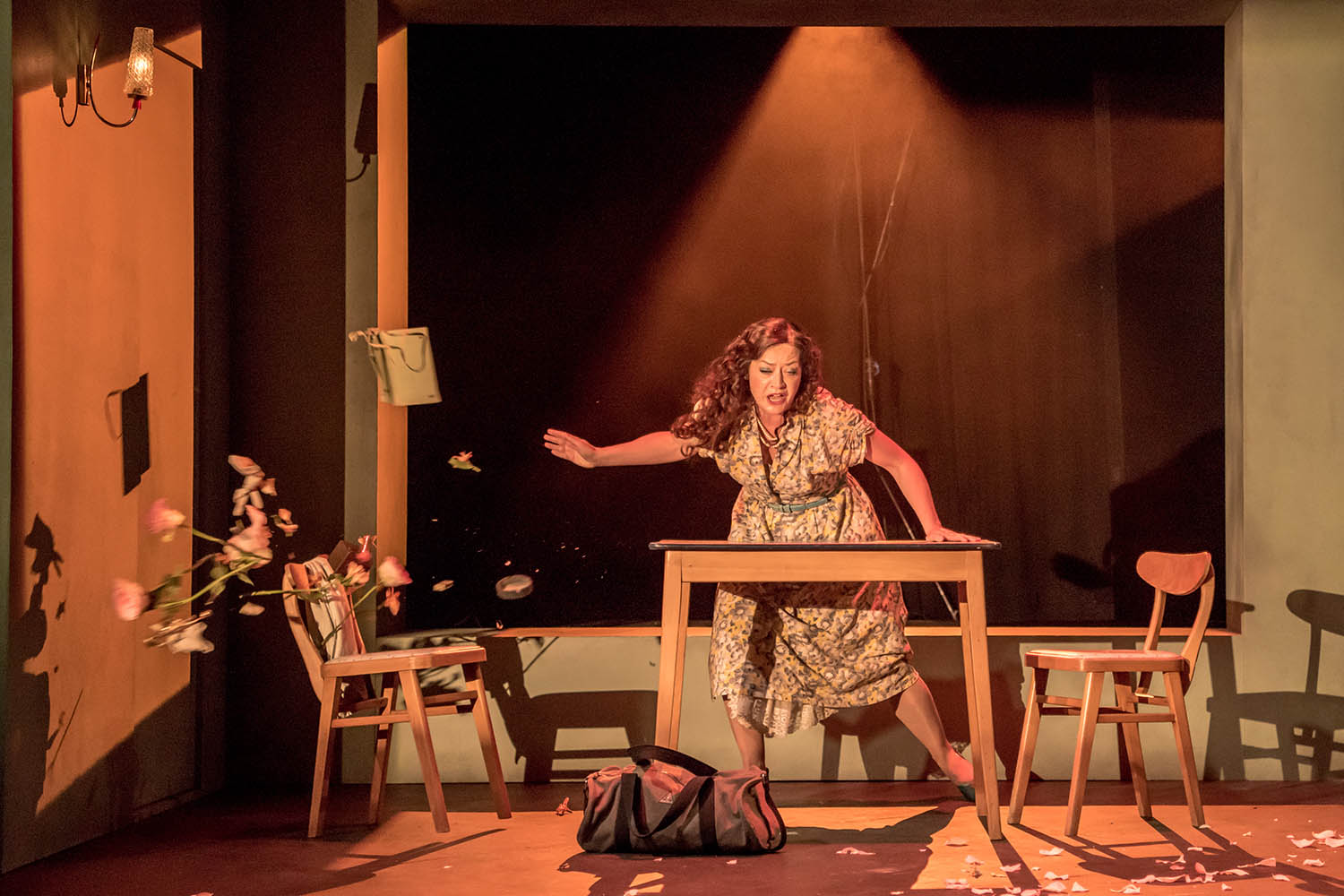Formica table and matching chairs: in a flash, these humble items of furniture conjure 1950s suburbia in all its wipe-clean, affordable modernity. They took centre stage in Leonard Bernstein’s Trouble in Tahiti (1952), half of a double bill with Poulenc’s La Voix Humaine (1958) in a new staging by Daisy Evans for Buxton international festival, conducted by Iwan Davies and designed by Loren Elstein. This was one of seven new productions – including four premieres under the heading “Shorts” – at this established but burgeoning event in the Peak District spa town.
Whatever our long view of that moment of postwar optimism, the potent fantasy of a little white house “out of the hubbub / Less than an hour by train” still resonates. Even with the dream still fresh, Bernstein saw beyond its perfect veneer. This is a bleak work. Sam and Dinah – stylishly sung by Charles Rice and Hanna Hipp – have been married for a decade. Where, they wonder, mostly privately, has that early romance gone? Dinah pops pills and spends lonely afternoons at the movies. Sam fine-tunes his manhood by going to the gym – or here, arguably more enjoyably, peels off a woman’s stockings in a bedroom.
Typically mixing wit and heart, Bernstein wrote his own libretto, later adding a cumbersome sequel, A Quiet Place, which takes its title from Dinah’s yearning aria in Tahiti. In addition to the two solo roles, a trio of close-harmony scat singers – Chloé Hare-Jones, Harun Tekin, Ross Cumming – provide a foot-tapping, catchy Greek chorus. Their crooning inventory of the joys of suburbia offsets Sam and Dinah’s emotional outpourings. On the first night, some of the orchestral ensemble could have been crisper, the music’s twists and angles sharper, but the mood of hope deferred was nicely caught.
In La Voix Humaine, Evans laid bare some of the unstated aspects of the text, in which we hear a woman, Elle – the brilliantly inventive Allison Cook – singing down the telephone to her former lover. What is true, and what imagined, is unclear. Evans’s interpretation, while diluting the intensity of a solitary figure on stage, added context and, through giving the Tahiti cast silent acting roles, turned the double bill into an ensemble show. Elstein’s designs, which also took a few cues from Edward Hopper (lighting by Jake Wiltshire), were cleverly flipped so that the bedroom in Tahiti became Elle’s lonely prison, all pink satin and boudoir lamps. Cook’s energy – she is also singing in Ambroise Thomas’s Hamlet at Buxton – as well as her versatility, are admirable.
Eyes, staring, ogling, are everywhere in Salome (1905), Richard Strauss’s opera based on Oscar Wilde’s play, spun from a few lines in the Bible about a dancing girl who demanded John the Baptist’s head on a plate. The salivating Herod lusts after his stepdaughter with “mole’s eyes”.
A capacity audience filed out of the Barbican after with a kind of stunned, post-rollercoaster lurch
A capacity audience filed out of the Barbican after with a kind of stunned, post-rollercoaster lurch
The lovesick Syrian captain Narraboth can only avert his gaze by killing himself. When Salome at last kisses the prophet’s severed head, she asks why he never looked at her: one glance and he would have loved her. All this imagery, and more, is ground into the music, via a note, an instrument, a recurring motif, as if by a pestle on stone.
Strauss’s ever-shocking masterpiece brought the London Symphony Orchestra season to a dumbfounding close last weekend. The performance also completed Antonio Pappano’s inaugural season as LSO chief conductor. He first conducted Salome in 1992, in his first season at La Monnaie, Brussels. He understands the work’s every nuance, not least how to make its dissonant grandeur and its saccharine vulgarity unite: the sudden almost foolish tinkle of a xylophone, the shake of a tambourine (when Salome’s dance is mentioned), the clack of a castanet.
In the breadth and transparency of his conducting, Pappano shows us why, as well as being distasteful, uneasy and full of nasty characters, Salome is one of the most fascinating of all operatic scores, superbly played by the large orchestra last week.
In the Lithuanian soprano Asmik Grigorian, the LSO had found a Salome whose voice can switch from light, winsome girlishness to adult entreaty, almost growling with fury in her lowest notes (including a challenging below-stave G flat). With minimal action, reliant mostly on an arched eyebrow, a crossed leg and a haughty expression, Grigorian conveyed all. In contrast, Wolfgang Ablinger-Sperrhacke’s snakish Herod, occasionally overwhelmed by the orchestra but always horribly compelling, shimmied and slid about, as if oiled by his own moral turpitude.
The rest of the stellar cast, led by Michael Volle (Jochanaan) and Violeta Urmana (Herodias), matched up. John Findon, in the short-lived but emotionally complex role of Narraboth, was radiant and beguiling. Look out for this gifted British tenor in Lady Macbeth at the Proms. A capacity audience filed out of the Barbican after with a kind of stunned, post-rollercoaster lurch. This Salome was one for the annals.
Trouble in Tahiti/La Voix Humaine runs at Buxton international festival until Friday
Photograph by Genevieve Girling
Newsletters
Choose the newsletters you want to receive
View more
For information about how The Observer protects your data, read our Privacy Policy

